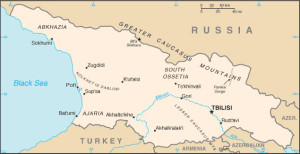
With an actual war going on between Georgia and Russia many fans are rightfully asking themselves the question what will happen to the Eurovision Song Contest 2009? Will Russia still host it? Will either of them withdraw? Should EBU even react?
There are many questions and even more possible answers. Last year violent fights between Serbia and Kosovo, who had just declared themselves independent, let the EBU to consider whether or not Belgrade would still be able to host the Contest. It happened shortly before the Contest and it would have been difficult to move it all to another country. This time there is plenty of time to find another host should the EBU find that the new situation is enough to take the Contest away from Russia.
This is the situation:
South Ossettia is a part of Georgia while the Northern part is located in Russia. Eduard Kokoiti, leader of South Ossettia, wants to unite the two parts under Russia. To help, Russia has already given a part of the population Russian passports and are offering their help in becoming independent from Georgia.
A peace force consisting of 500 soldiers from Russia, 500 from Georgia and 500 from Northern Ossettia have been placed in the area since 1992.
Georgia’s president Mikhail Saakasjvili suggests an agreement that will give South Ossettia a kind of self-government, but will keep them under Georgian flag. South Ossettia’s leader has turned down the offer. Georgian military entered the area and surroundered the “capital” of South Ossettia.
Russia responds by using their military forces to attack Georgia. They drive their tanks into the country and bomb targets in the Georgian capital.
The Georgian government declares a truce and stops their fights in South Ossettia, but so far Russia has not agreed to this truce and continues the war.
Azkhabia suffered from a civil war in 1993 with more than 10,000 people killed and 200,000 Georgians were forced to leave this part self-government part of Georgia where 20% of the population were ethnic Azkhabians who demand independency from Georgia. In 1994 they elected a new government, which is supported by Russia, and in 1999 they officially declared themselves independent from Georgia. No country aside from Russia has recognised them and as such are blocked from trading with other countries. Russia has issued most of the population Russian passports and they keep military forces in the country, as they fear that Georgia will try to take the area back. United Nations have for several years been trying to negotiate a solution to the situation, but without luck.
Most of the international society has reacted strongly towards Russia. They might think Georgia could have handled the situation differently, but the fact that Russian military troops went into Georgia has been the leading factor in Russia being blamed for the war. How, if and when EBU might react we don’t know – and the question is also whether or not they should get involved.
There are several possible scenarios: EBU might draw the conclusion that a war between the two countries has nothing to do with them as long as long as Russia can offer some kind of guarantee that there won’t be any fights near the host city during the 2009 Eurovision Song Contest.
They might want to set an example and follow the international line by deciding on another host country for the Contest. This will satisfy the many countries who right now don’t want to have anything to do with Russia and avoid that these might want to withdraw from the 2009 edition in case it is still to be held in Russia.
EBU might think that taking the host role away from a big country like Russia is too much and, as they don’t want the Georgian delegation to feel uncomfortable and the Russians to sabotage them, they may consider in a discreet way to ask Georgia to withdraw from the 2009 Eurovision Song Contest.




















